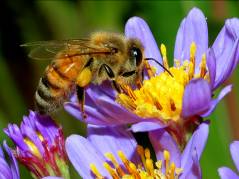By J.C. Kumarappa
{As the debates rage in our country and worldwide as to who should be in power and who is corrupt and how our economy should be designed and whose interests it should meet and countless other dilemmas that confront us, Kumarappa and his practical simple solutions may seem to some to be simplistic and impractical but looking deeper one wonders how life on earth can once again be beautiful and anxiety free if only everyone follows these basic principles.}

Religion , as practiced today, is largely institutional and ritualistic. It has lost its grip over the everyday actions of men. Hence, there are many who have lost faith in it and regard it as a superstition to be shunned. As the natural consequence of excluding religion from life, economics has been divorced from moral considerations on the plea of business being business.
In the traditional archives of knowledge, religion, sociology and economics have all been reserved in their separate and exclusive spheres. Man has been divided into various watertight compartments. The left hand is not to know what the right does. Nature does not recognise such divisions. She deals with all life as a whole. Hence, in this’ little book an attempt is made to co-ordinate the various principles governing different departments, and to focus them all on, the many problems of everyday life of man as an integral undivided unit.
The object of the present quest is to relate our spiritual and higher self back to life so that the daily routine of mundane existence may be regulated in accordance with the dictates of our better self, and to find a way of life that will lend purpose for existence and action to such as have no use for the present day traditional religion because of its other worldliness from humdrum of everyday life. An effort is made here to bring all walks of life into alignment with the universal order. What men of religion term ‘eternal life’ or ‘Union with the Godhead’ has been interpreted in relation to the everyday life of man in the title of this book as ‘The Economy of Permanence’.
The approach may be novel, but if it sets others thinking on the ways and means of achieving the end aimed at, this venture would be amply justified.
‘Work’ in nature consists in the effort put forth by the various factors-insentient and sentient-which cooperate to complete this cycle of life. If this cycle is broken, at any stage, at any time, consciously or unconsciously, violence results as a consequence of such a break. When violence intervenes in this way, growth or progress is stopped, ending finally in destruction and waste.
Nature is unforgiving and ruthless. Therefore, self-interest and self- preservation demand complete non-violence, co-operation and submission to the ways of nature if we are to maintain permanency by non-interference with and by not short-circuiting the cycle of life.
Even sentient creatures have to fall in line and function properly in their own sphere if they are to exist. An earthworm by its movements in the earth, loosens the soil allowing it to absorb air and water. When it feeds on he earth containing vegetable matter, it thoroughly mixes the various constituent parts in its stomach and throws out a well prepared and fertilized soil- worm casts- from which plants can draw their own nutrients easily.
Here is a sample of the form of vital co-operation existing between soil, plant and animal life similar to the one where bees and butterflies fertilize the flowers of plants. In return for such services or ‘work’ done, the worker unit gets its feed. In this way nature pays its wages honestly in the form of food and nourishment in return for every benefit received by her in obtaining cooperation and bringing about co-ordination of the manifold factors-inanimate and animate-in air, land and water.
The life in the vegetable kingdom is immobile. The seeds can only fall directly below, near the parent plant or tree. If all seeds fall and germinate around the parent plant it will create a suffocating congestion. It is necessary to broadcast the seed further afield. To do this, nature commandeers the services of birds, animals etc. Here the mobile creature performs a special function. A bird may eat the fruit of a plant and pass out the seed, perhaps miles away. It does this co-ordinating work as a part of its own existence and not as an obligation to anybody. It eats to satisfy its own hunger. While performing its own primary function it fulfils its role in the cycle of life.
In this manner nature enlists and ensures the co-operation of all its units, each working for itself and in the process helping other units to get along their own too-the mobile helping the immobile, and the sentient the insentient. Thus all nature is dovetailed together in a common cause. Nothing exists for itself. When this works out harmoniously and violence does not break the chain, we have an economy of permanence

